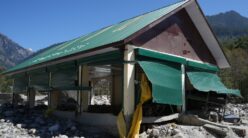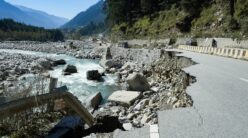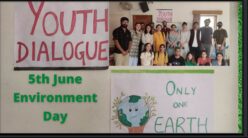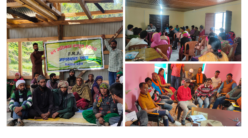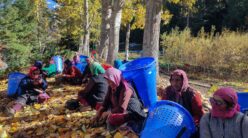पश्चिमी हिमालय में पर्यावरण समावेशी व समुदाय-आधारित पर्यटन स्थानीय समुदायों के लिए कार्यशाला
31 अगस्त से 3 सितम्बर, 2018
संभावना संस्थान, पालमपुर, हिमाचल प्रदेश
पृष्ठभूमि
भारत में पर्यटन की नीतियाँ पर्यटकों की मांग को केंद्र में रखते हुए और निजी व्यवसायियों के मुनाफे को अधिक से अधिक बढाते जाने के उद्देश्य से बनाई जाती हैं, जिससे पर्यटन एक कारपोरेट उद्योग बन गया है। पर्यटकों की इच्छाओं को पूरा करने के लिए पर्यटन के नए-नए तरीके ईजाद करे जा रहे हैं। अधिक से अधिक उपभोग पर आधारित पर्यटन एक वर्ग के लिए मुनाफा कमाने का मौका जुटाता है, मुख्यधारा का यह पर्यटन का माडल स्थानीय पर्यावरण और वहां रहने वाले लोगों की ज़िन्दगी पर पड़ने वाले सामाजिक, पर्यावरणीय, आर्थिक और सांस्कृतिक प्रभावों के बारे में रत्ती भर भी परवाह नहीं करता है। हिमालय में ख़ास तौर पर हिमाचल और उत्तराखंड की तरफ यात्राएँ बहुत पहले से होती रही है, तब इनका स्वरूप तीर्थांटन का था। बहरहाल, अंग्रेजों के समय में पहाड़ों में शहरों की स्थापना के बाद मुख्यधारा का पर्यटन कश्मीर, उत्तराखंड और हिमाचल प्रदेश में तेज़ी से बढ़ा। पर्वतारोहण, पैदल यात्राएँ, बर्फ में खेल तथा रोमांचक खेलों की खोजों के बाद से लोगों की हिमालय की तरफ यात्रा करने की प्रवृत्ति बढ़ती जा रही है। हिमाचल प्रदेश और उत्तराखंड में पिछले एक दशक से पर्यटकों की संख्या में बहुत बढ़ोत्तरी दिखाई पड़ रही है। आज हिमाचल में साल भर में एक करोड़ से अधिक पर्यटन आ रहे हैं. इसका नतीजा यह हुआ है कि इन राज्यों में सड़कों, बाज़ारों और अन्य इमारती ढांचों को बढ़ाया जा रहा है। जिसके नतीजे में इन राज्यों में संसाधनों जैसे जंगल, पानी और ज़मीनों की मांग तेज़ी से बढ़ गई है। इस साल की गर्मियों में शिमला और नैनीताल के निवासियों ने पर्यटकों से कहा है कि आप हमारे यहाँ की यात्रा रोक दीजिये क्योंकि हमारे इलाके में पानी की समस्या पैदा हो चुकी है। यह घटना हालात की गंभीरता की सही तस्वीर हमारे सामने रखती है।
ऐसे में नकारात्मक प्रभावों और अनैतिक मुनाफे पर टिके हुए बड़े पैमाने पर छाए हुए पर्यटन पर रोक लगाया जाना अनिवार्य हो गया है. साथ ही इस मॉडल के उत्तर में वैकल्पिक प्रयोग भी किये जा रहे हैं जो समुदाय के आर्थिक, सांस्कृतिक और पर्यावरण के हितों को ध्यान में रखने वाले मॉडल हैं। मुख्यधारा का पर्यटन का मॉडल बाजार से नियंत्रित होता है लेकिन पर्यटन का वैकल्पिक मॉडल स्थानीय समुदाय द्वारा नियोजित और नियंत्रित होता है जिसमें लोगों के प्रकृति और संसाधनों पर आधारित जीविका के अन्य स्रोतों का भी उतना ही ख्याल रखा जाता है।
पिछले दो दशकों में भारत में ख़ास तौर पर हिमालय क्षेत्र में अलग–अलग सिद्धांतों पर आधारित इस तरह के अनेकों प्रयोगों को अपनाया जारहा है जैसे ईकोटूरिजम, ग्रामीण/ कृषि / फ़ार्म पर्यटन, समुदाय-आधारित पर्यटन और ज़िम्मेदार पर्यटन। परन्तु ज्यादातर जगहों में देखा जा रहा है कि नये-नये नामों से प्रचारित पर्यटन के तरीके जैसे इको-टूरिस्म मुख्यधारा के पर्यटन से ज्यादा अलग नहीं है और ना ही इनमें किसी प्रकार का नियोजन या नियंत्रण दिखता है। सुनने में बेहतर लगने वाले इन पर्यटन के विभिन्न मॉडल को आगे बढ़ाने का काम केन्द्रीय और राज्य सरकारों के पर्यटन मंत्रालय, वन विभाग, निजी व्यवसायी, गैर सरकारी संगठन, यहाँ तक कि राष्ट्रीयकृत बैंक और अन्तर्राष्ट्रीय वित्त संस्थाएं जिनमें एडीबी, और विश्व बैंक शामिल हैं, भी कर रहे हैं। इस सब के बीच में लोग ‘होम स्टे’ शुरू कर रहे हैं ताकि अपनी आय बढ़ा सकें।
कार्यशाला के बारे में
एक तरफ जहां समुदाय-आधारित पर्यटन बाज़ार आधारित मुख्यधारा पर्यटन का जवाब तो है लेकिन सोचने का मुद्दा यह भी है कि यह बाज़ार के बनाये हुए ढांचों से खुद को आज़ाद रखते हुए अपना अस्तित्व कैसे बचा सकता है? समुदाय आधारित और पर्यावरण की तरफ अनुकूल पर्यटन की ओर क्या और कैसे कदम लिए जाने चाहियें । इन सवालों पर चर्चा करने के लिए 4 दिनों की कार्यशाला का आयोजन इक्वेशंस, हिमधारा कलेक्टिव और संभावना ने मिलकर किया है। इसका मक़सद चर्चाओं और विचारों के आदान-प्रदान की मार्फ़त समुदाय आधारित पर्यटन की गुत्थी को समझना है।
कार्यशाला में चर्चा के मुख्य बिन्दु:
- उत्तराखण्ड और हिमाचल प्रदेश में पर्यटन के क्षेत्र में रुझान और जुड़े मुद्दे
- इन क्षेत्रों में समुदाय आधारित पर्यटन कि स्थिति और नीतियां
- इन क्षेत्रों में समुदाय आधारित पर्यटन के अनुभवों और समझ को साझा करना
- समुदाय आधारित पर्यटन के संचालन के संभावित रास्ते और मुख्यधारा के पर्यटन पर स्थानीय स्तर पर नियंत्रण की संभावनाएं
यह कार्यशाला किसके लिए है
हिमाचल और उत्तराखंड में समुदाय-आधारित पर्यटन पर काम कर रहे या करने के इच्छुक व्यक्ति/ सस्थाएं/ संगठन/ समुदाय के लोग/ पर्यावरण-सामाजिक कार्यकर्ता
कार्यशाला के अंशदान के लिए सुझाव:
यह कार्यशाला किसी भी सरकारी संस्था या कम्पनी द्वारा आयोजित नहीं करी जा रही है। अत: आशा करते हैं प्रतिभागी अपने रहने-खाने की व्यवस्था के कुछ हिस्से को पूरा करने के लिए 2500/- रूपये का अंशदान कर सकते हैं। जो प्रतिभागी अंशदान की राशी में कुछ छूट चाहते हैं वे आवेदन में अलग से इसका ज़िक्र कर सकते हैं या 8894227954 पर बात कर सकते हैं।
भाषा – हिंदी
तारीख – 31 अगस्त से 3 सितम्बर, 2018
स्थान – संभावना संस्थान, पालमपुर, हिमाचल प्रदेश
संभावना पहुँचने के लिए मार्गदर्शन- http://www.sambhaavnaa.org/contact-us/
अन्य जानकारी अथवा पूछताछ के लिए- व्हाट्सप्प/कॉल – शशांक : +91-889 422 7954, ईमेल [email protected]
Understanding Community-based Tourism
A workshop for community members interested in building alternative initiatives for responsible travel in the Western Himalayas
31st August to 3rd September 2018
Sambhaavnaa Institute, Palampur, Himachal Pradesh
Background
Tourism policy in India has centred on the demands of the tourist, and the profit maximisation motive of the private operators leading to the establishment of a corporatized tourism sector. New forms of tourism are being invented to satisfy tourist’s urge. While the mass consumptive nature of tourism reaps profits for a section of the industry, this mainstream model of tourism has scant regard for the adverse environmental, social, economic and cultural consequences on the lives of people who reside in these areas. Travelling to the Himalayas, especially the western side, has existed for a long time: in the form of pilgrimages. However, from the colonial period and with the establishment of the hill stations mainstream tourism had been steadily rising in Kashmir, Himachal and Uttarakhand. Today, with the advent of activities such as trekking, mountain climbing, sightseeing, winter sports, and adventure tourism, traveling to the Himalayas is a growing trend. Uttarakhand and Himachal have especially seen a massive increase in tourist footfalls over the past decades. This has meant expansion of construction, roads, markets, infrastructure which has made severe demands on the resources (forests, water, and land) of these states. The recent news of residents of Shimla and Nainital asking tourists to stop visiting as they reeled under a water scarcity is an illustration of the severity of the crisis.
In response to the negative impacts and skewed economic benefits of the mass tourism developmental model, alternatives are being attempted, albeit slowly, in favour of a more socially just, equitable and redistributive (of power/resources/benefits) form of tourism. These forms not only strive for better terms for community members in an externally controlled and managed tourism sector, but it also implies a breaking away from the current tourism sector in terms of control, ownership, management and benefits. Some of these initiatives have recognised the need for preservation of ecological spaces in order to also protect other means of natural resource-based livelihoods as sources of sustenance apart from catering to responsible traveling.
Over the past two decades, within the country, especially in the Himalayan states, these have taken shape under various concepts – ecotourism, rural /village, farm / agriculture tourism, endogenous tourism, responsible tourism and community-based tourism (CBT). Much of the push to adopt these ‘better- sounding’ tourism policies has come from central and state tourism ministries and departments, forest departments, private operators, non-governmental organisations and even nationalised banks and international financial institutions like the ADB and World Bank. Amidst this, are people who started home stays to augment their income, communities coming together who wish to develop a form of tourism based on their vision, realities and resources. Sometimes, these initiatives have grown to influence the development priorities of the regions they operate in. However, in most cases the government pushed models, which may not necessarily be radically different from commercial tourism, are seen in policy frameworks, with no regulatory mechanisms in place.
About the workshop
While some initiatives see CBT as a response to mainstream market based tourism, the concern is how much devoid of market structures can the CBT initiative continue to exist. If there needs to be the rejection to the market structures, what other community structures/ institutions need to be created that can fulfill the need of communities in natural environments, and resist market forces.
Recognising that tourism is emblematic of the paradoxes and challenges of modern development, this 4 day workshop, jointly organised by EQUATIONS, Himdhara Collective and Sambhaavnaa, aims to unravel through discussions and exchange our understanding of community-based tourism:
- Trends and issues of tourism in the Western Himalayas
- On the process and politics of the context of CBT within the Western Himalayan region
- Share experiences & insights on the operational aspects, and
- Discuss on possible ways of regulating CBT initiatives and ideas for regulation of mainstream tourism at the local level
Through this workshop we hope to learn from each other’s experiences and a possibility of coming together of CBT practitioners to support sustainable initiatives and to challenge mainstream tourism practices.
Who is this workshop for: Individual practitioners, organisations, community activists, representatives from Himachal, Uttarakhand, keen on sharing their experiences with CBT, and learning setting up CBT initiatives in their areas.
Dates: 31st Aug to 3rd Sep 2018 (4 days)
Suggested Contribution: In order to cover some of the lodging and boarding costs we hope that participants could contribute Rs 2500/- towards workshop costs. Participants who want the contribution amount to be subsidised may indicate in the application form or contact us separately.
Language: Hindi.
Venue: Sambhaavnaa Institute, Palampur, Himachal Pradesh
Contact: For more information please whatsapp/call – Shashank on 889 422 7954 or email: [email protected]
Getting to Sambhaavnaa: http://www.sambhaavnaa.org/contact/how-to-reach-us/


